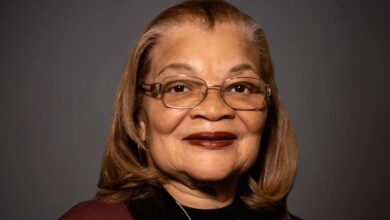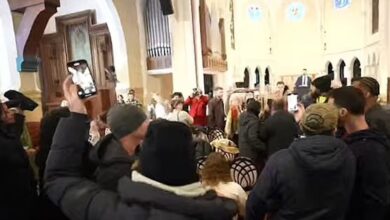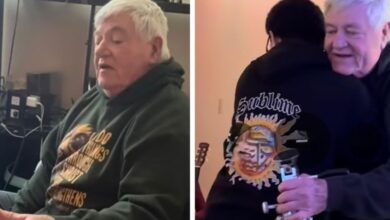Supreme Court stops execution of inmate denied pastor’s touch

The Supreme Court has halted the execution of a Texas death row inmate who had requested his pastor be allowed to lay hands on him in the execution chamber. The inmate, John Henry Ramirez, was scheduled to be executed Wednesday night.
The court also agreed to hear his case in its upcoming docket this fall, challenging the state’s prohibition of chaplains’ vocal prayer and physical contact with inmates inside the execution chamber.
The case brings up a central tenet for Christians and the Biblical mandate to visit those in prison and offer care for the condemned. It is an issue for which Christians, Jews, Muslims and Buddhists have also found common ground. Other states have banned not only Christian pastors but also spiritual advisors within the Muslim and Buddhist communities. Religious rights organizations say every American should be concerned by the bans.
“The application for stay of execution of sentence of death presented to Justice Alito and by him referred to the Court is granted,” said the Supreme Court in an order issued late Wednesday evening. The case could be argued in October or November 2021, according to the court order.
The order came about three hours before Ramirez was scheduled to be executed. He was sentenced to death in 2008 for the 2004 murder of 45-year-old convenience store clerk Pablo Castro.
An amicus brief filed by The Becket Fund for Religious Liberty on Tuesday, Sept. 7 called the updated Texas Department of Criminal Justice policy a clear violation of Ramirez’s Constitutional rights.
“Given that focus on history, and the long tradition of audible prayer by clergy at the moment of death, the scope of the constitutional right is clear—audible prayer should be allowed,” the attorneys explained.
Tradition that predates the founding of the United States upholds “respectful, nondisruptive—but audible—prayer at the time of executions,” said the brief.
“Such expression was key to both the solace and spiritual help sought by the condemned and the guiding role the clergy sought to provide.”

Ramirez argued that a Texas Department of Criminal Justice prohibition on audible prayer and physical touch in the execution chamber was an infringement upon his religious liberty. Ramirez sought to have his spiritual advisor, Pastor Dana Moore of Second Baptist Church in Corpus Christi, present with him as he receives lethal injection, and laying hands on him as he is dying.
The court’s decision was praised by a wide range of both Protestant and Catholic advocates for religious freedom
“We welcome the Court’s decision to set this case for argument this fall. This issue deserves the Court’s, and the country’s, full attention,” Eric Rassbach, vice president and senior counsel at The Becket Fund for Religious Liberty, stated on Thursday. “We will urge the Court to recognize that the age-old practice of comfort of clergy is protected by the United States Constitution.”
State officials argued that the audible prayer and laying of hands in the chamber would be disruptive and a potential security risk.
Texas in 2019 banned spiritual advisors from the chamber, following condemned inmate Patrick Murphy’s request for a Buddhist chaplain to join him at his execution. At the time, Texas only allowed state employees in the death chamber, and the state did not employ a Buddhist chaplain.
In April 2021, the state criminal justice department updated its policies to once again allow spiritual advisors of any creed to join condemned inmates in the execution chamber. Later, the department added a restriction that chaplains could not pray out loud.
Texas is not the only state that bans spiritual advisors.
Charles L. Burton Jr., a death row inmate in Alabama, sued in federal court to have one present.
Burton, who was sentenced in 1992 for participation in a murder during a robbery, filed suit in 2019 after the state of Alabama denied a Muslim inmate from having an imam serve as a spiritual adviser at his execution, citing state policy that only allowed Christian clergy to serve as chaplains in the death chamber. In response, the state barred all spiritual advisers, a move criticized by Spencer Hahn, one of Burton’s lawyers.
At the time, Hahn stated, “They’re wrong legally, they’re wrong constitutionally. Morally they’re wrong.”
Alan Cross, a Baptist pastor who opposes chaplain bans against any faith, believes this policy puts Christian souls in jeopardy.
“The reason why Christians in Alabama should care about this is because it is about more than just the punishment of the man,” said Cross. “We should care about his eternal destiny. We should care about a soul.”
Cross said Christian theology teaches that inmates facing execution can ask for mercy and forgiveness, and God will hear their prayer until their very last breath. A chaplain can help spiritually guide them through this profound moment.
“If we are going to execute people, then we should at least offer them the benefit of their faith to have a pastor or imam to be with them to contemplate these eternal things at the very end,” said Cross.
Burton’s case is scheduled to be heard this year.
–Metro Voice and CNA







